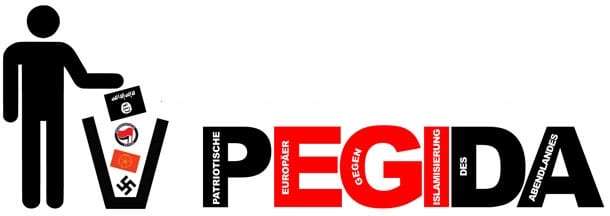The Volokh Conspiracy
Mostly law professors | Sometimes contrarian | Often libertarian | Always independent
He said 'Jehovah'!
Dr. Jogchum Vrielink (University of Leuven, Belgium) reports on an incident related to the Dutch pig hat story. The wearer of the hat, a leader in the Pegida movement, was arrested for displaying a sign with a swastika. "The city's mayor," Vrielink reports, "had, beforehand, explicitly prohibited displaying swastikas during the demonstration (and as you may know many countries in Europe regard public display of swastikas to violate hate speech legislation anyhow)."
But the swastika in this particular Pegida logo is being thrown into the trash, together with an Islamic State flag, a flag of the group Antifascist Action" and what appears to be a Kurdistan Workers' Party flag. (Antifascist Action itself seems to have used a man throwing a swastika into a trash can as a symbol of its own.) According to Vrielink and NLTimes.com, the logo in question was this one:

But, the NLTimes (Zack Newmark) reports,
[T]o the city of Amsterdam the context is not at issue.
"The use of swastikas will not be tolerated, even if they are included in a protest sign or other form of expression where the National Socialist ideology is rejected, or in any other manner of speech whatsoever," the city said. It stated that the swastika has too strong of a link with Amsterdam's "traumatic past," and that its display "may lead to intense reactions, with a disturbance of public order being the result."
That doesn't seem sensible to me, much as I loathe Nazism. It is hard to see much disturbance of public order in the Netherlands that inherently stems from pictures of a swastika being thrown in the trash; if a disturbance happened, it would be because people were disturbed by Pegida's general viewpoint, not the swastika. Nor can this be justified as an attempt at viewpoint neutrality (no swastika use by Nazis, no swastika use to criticize Nazis), because it's clear that the suppression of the symbol is precisely because of the viewpoint it expresses.
Vrielink told me that "It's noteworthy that even in Germany (unsurprisingly one of the strictest countries in this regard, where symbols having to do with national-socialism are explicitly banned by a special criminal provision) banners/signs that use the swastika dismissively (like the anti-fascist movement does, for instance) have been found to be lawful (not exactly viewpoint-neutral, obviously, but that's Europe for you)." I wonder whether indeed this is a rule that will be applied to Pegida but not to other groups that depict a swastika negatively; if anyone has more evidence on that, I'd love to see it.
(If you're unfamiliar with the work to which the post title refers, see here.)


Show Comments (0)